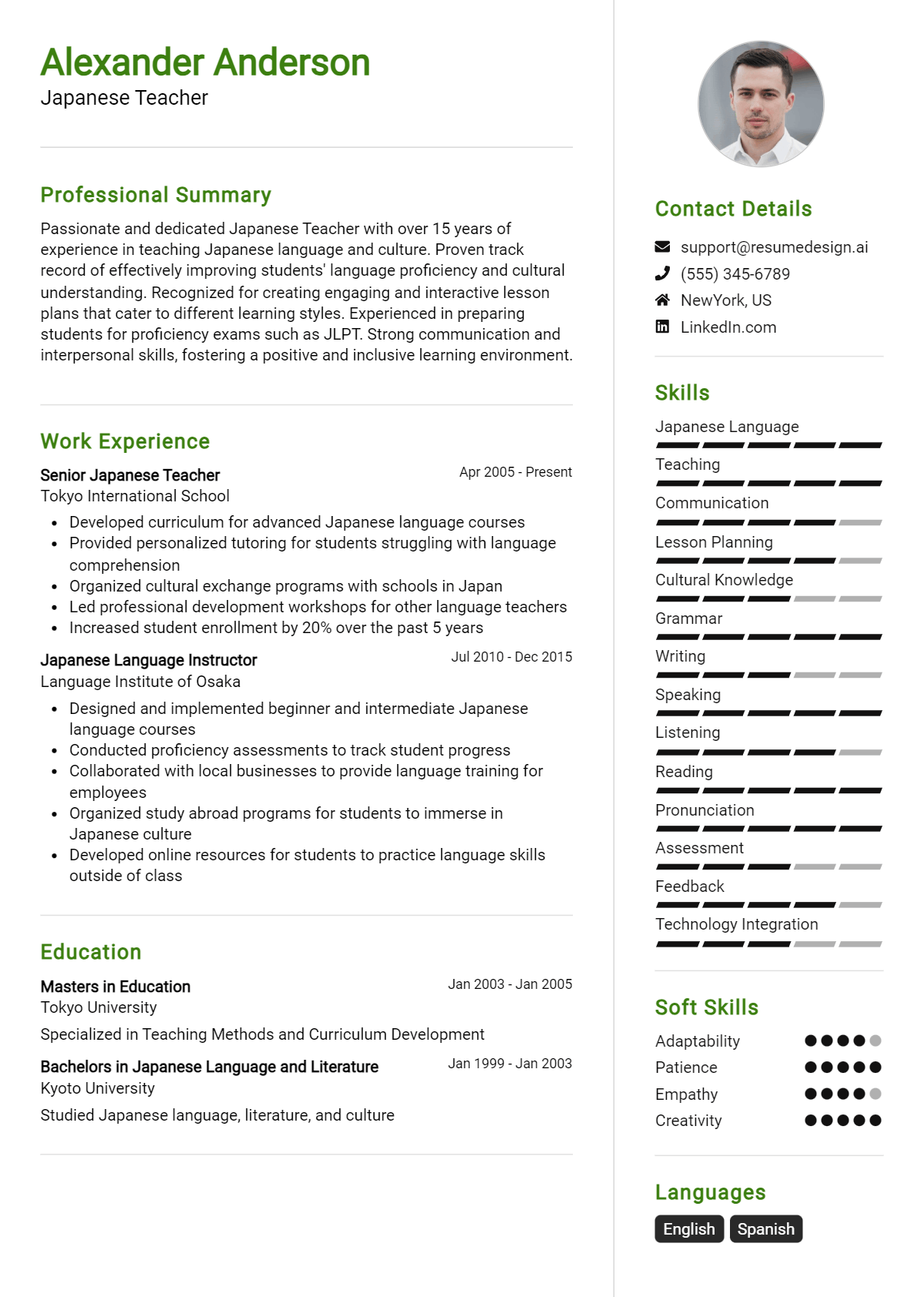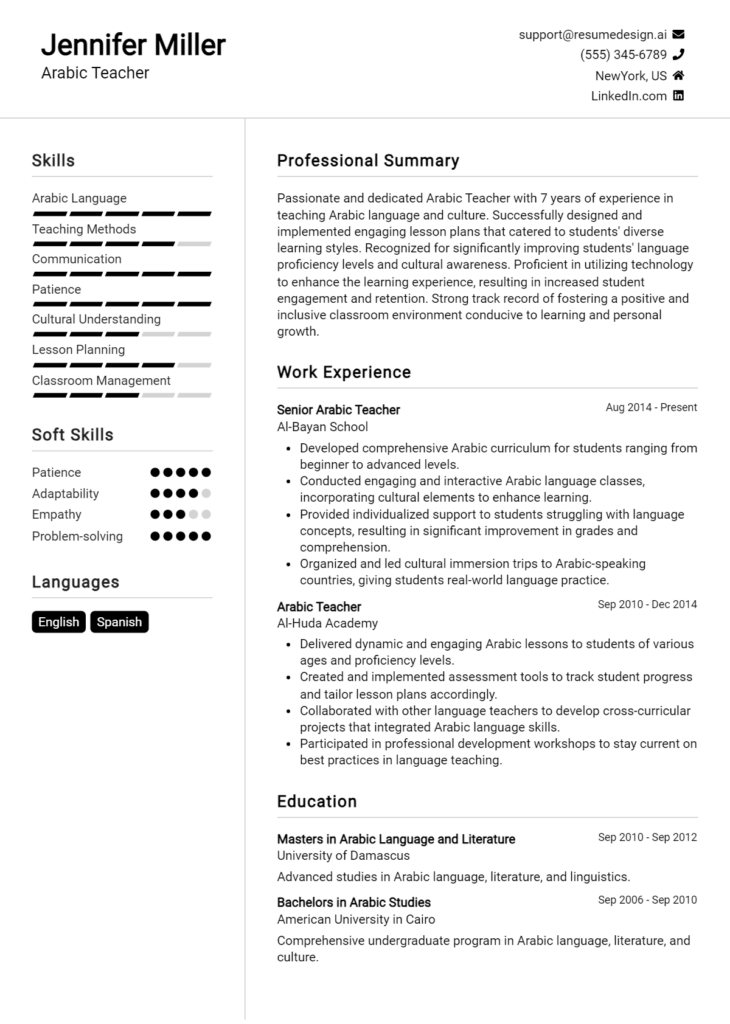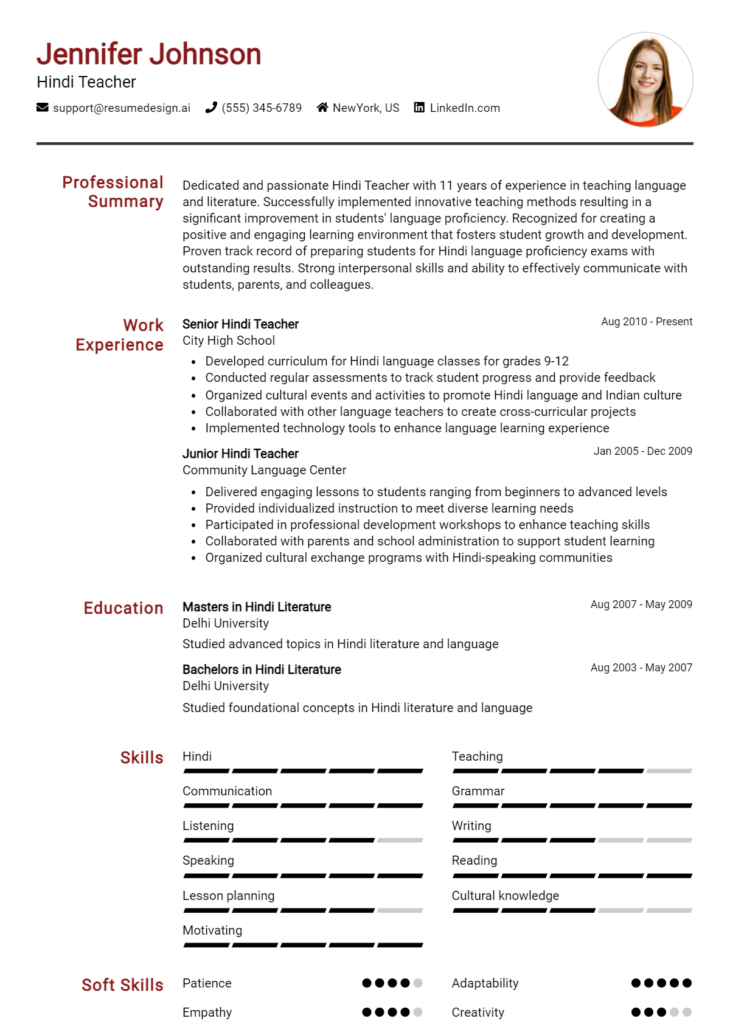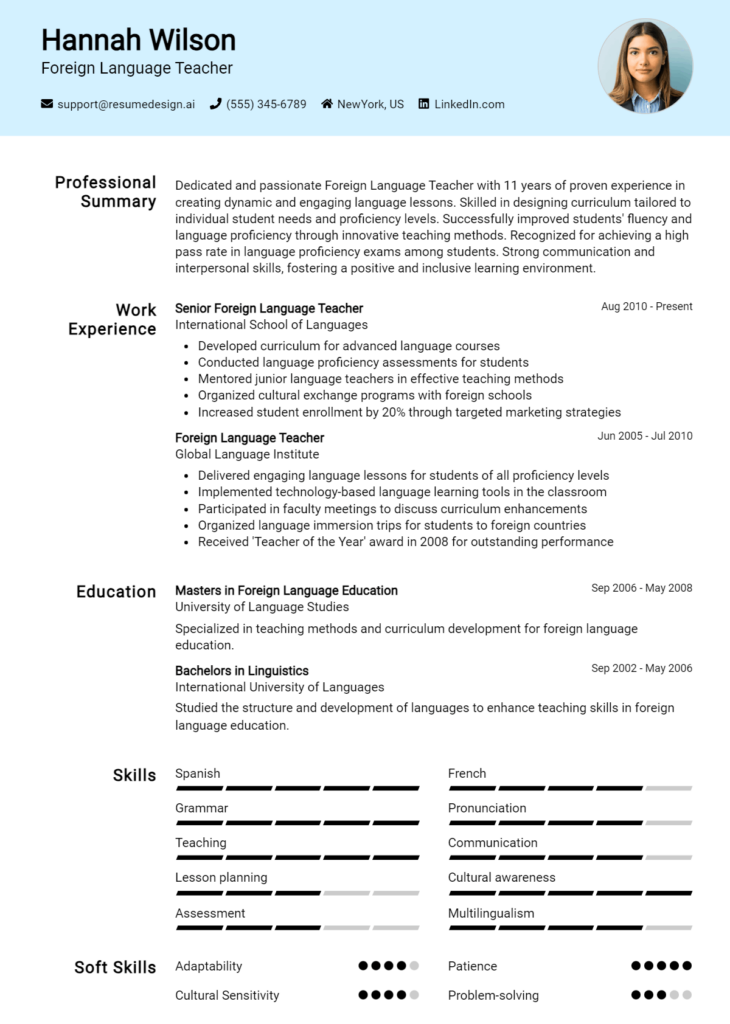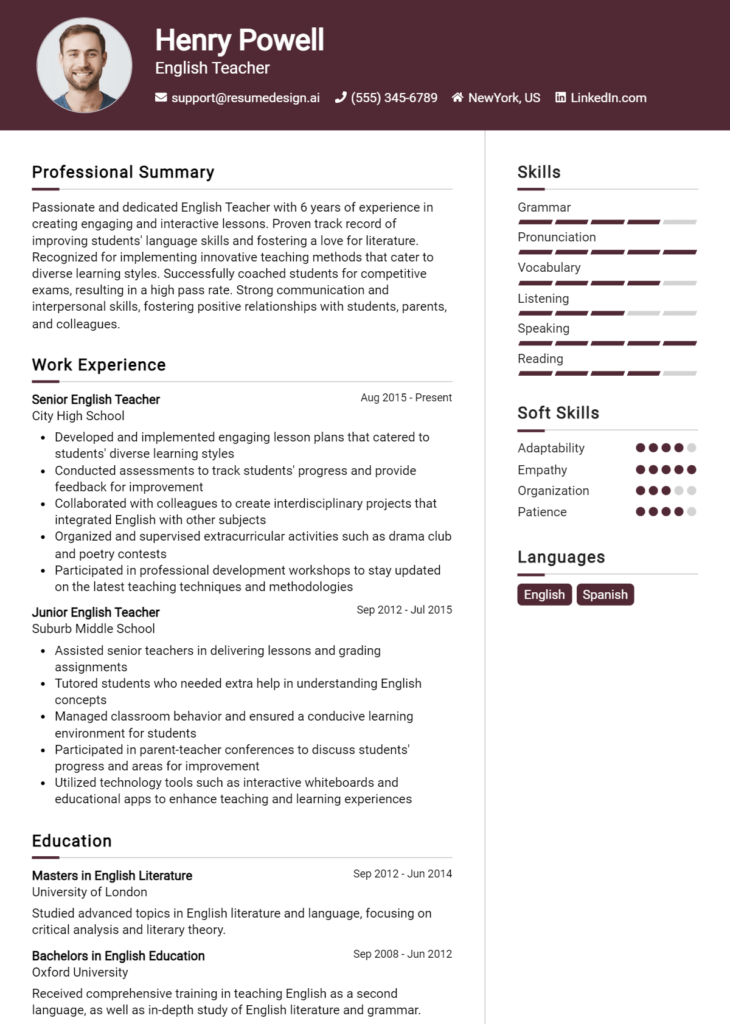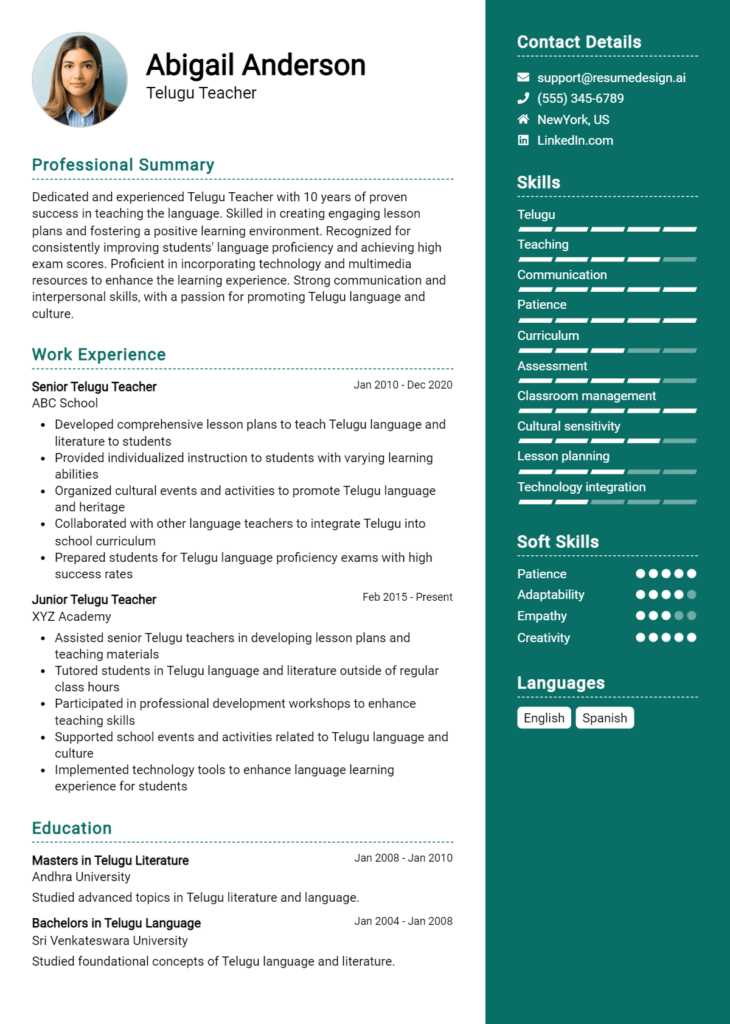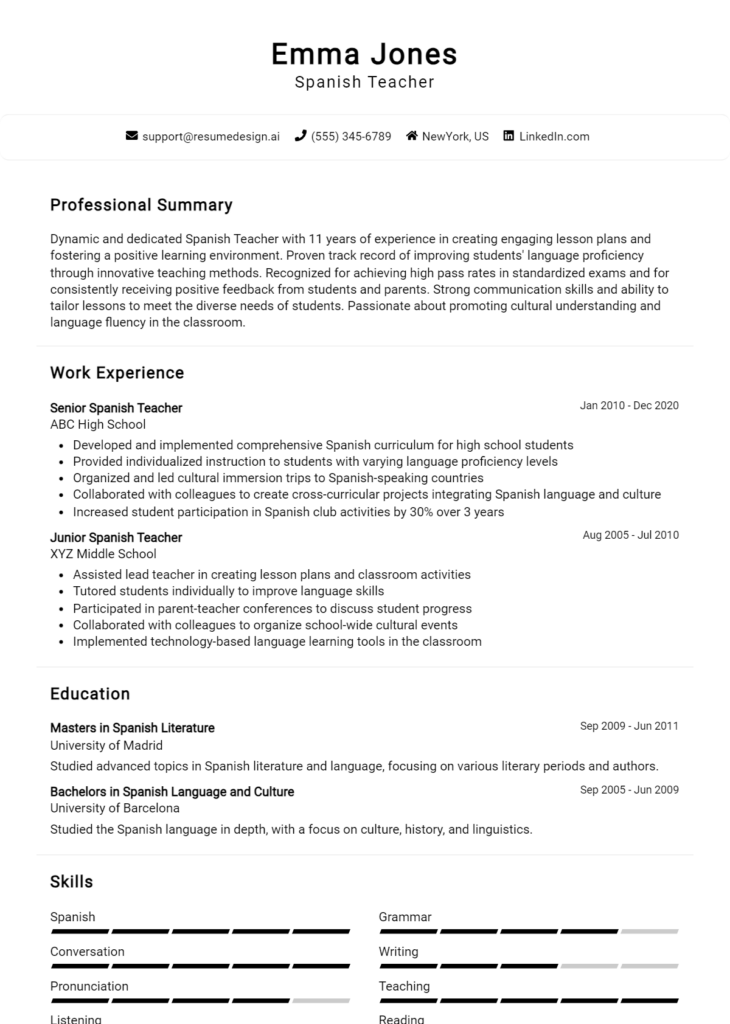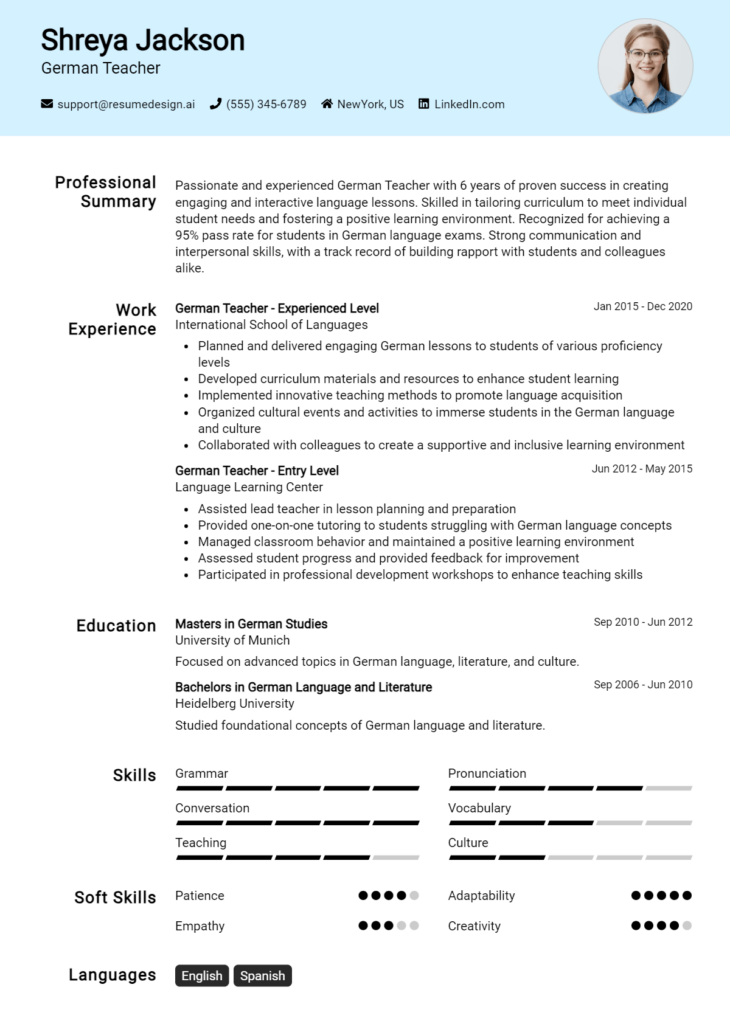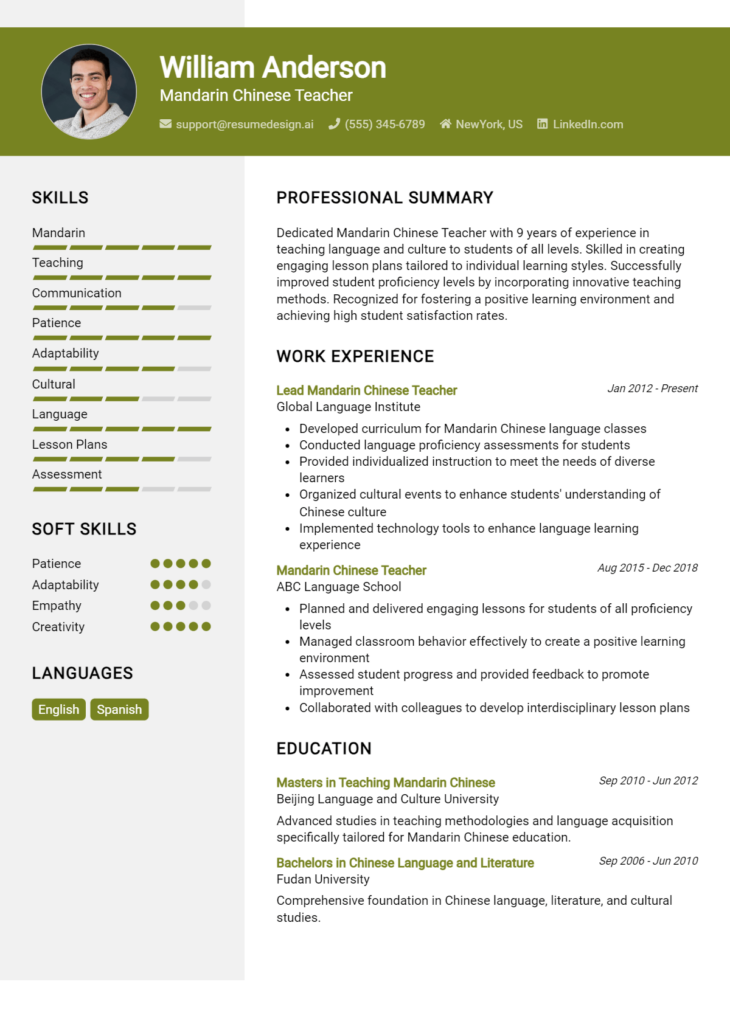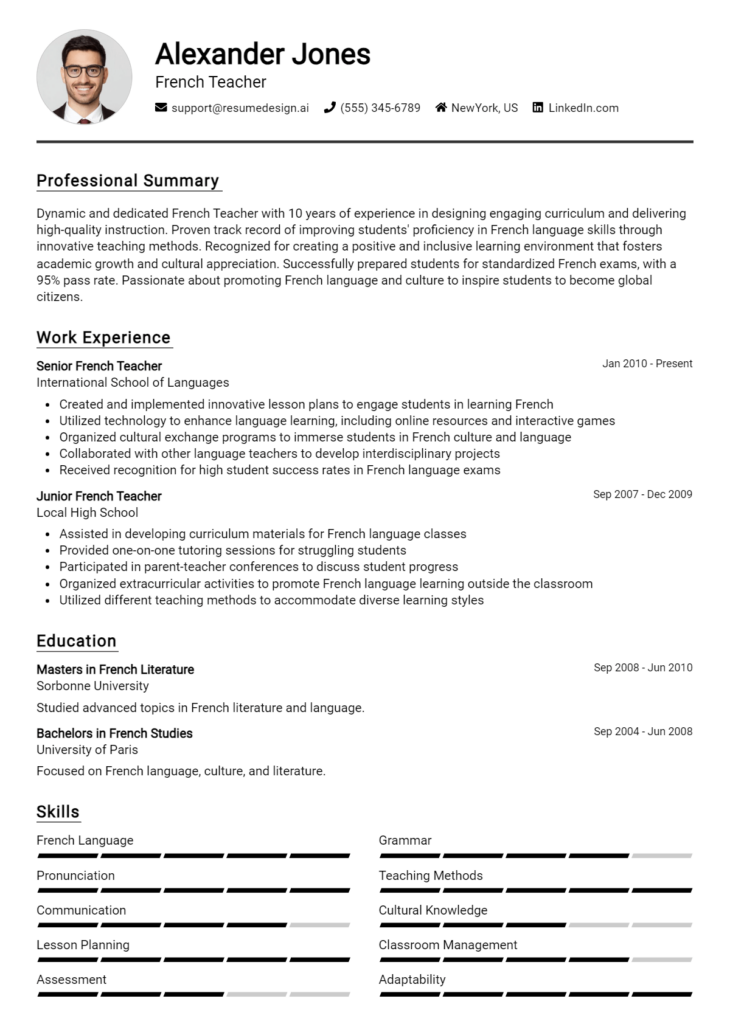Japanese Teacher Core Responsibilities
A Japanese Teacher plays a vital role in bridging cultural understanding and language proficiency across various departments. Key responsibilities include developing lesson plans, assessing student progress, and fostering a positive learning environment. Essential skills encompass technical knowledge of the Japanese language, operational planning for curriculum delivery, and problem-solving abilities to address diverse learning needs. These competencies are crucial for achieving the organization’s educational objectives, while a well-structured resume can effectively highlight these qualifications and experiences.
Common Responsibilities Listed on Japanese Teacher Resume
- Develop and implement engaging lesson plans for different proficiency levels.
- Assess and evaluate student progress through tests and assignments.
- Facilitate classroom discussions and encourage student participation.
- Provide individualized support to students needing extra help.
- Integrate cultural lessons to enhance language learning.
- Maintain classroom management and a positive learning environment.
- Collaborate with other educators to create interdisciplinary projects.
- Utilize technology and multimedia resources in teaching.
- Organize extracurricular activities related to Japanese culture.
- Communicate effectively with parents regarding student progress.
- Stay updated on language education trends and methodologies.
- Participate in professional development workshops and training.
High-Level Resume Tips for Japanese Teacher Professionals
In the competitive landscape of education, a well-crafted resume serves as a pivotal tool for Japanese Teacher professionals aiming to make a lasting first impression on potential employers. Your resume is often the first glimpse hiring committees have into your qualifications and teaching philosophy, making it essential to present your skills and achievements effectively. A compelling resume not only showcases your expertise in the Japanese language and culture but also highlights your teaching experience and pedagogical methods. This guide will provide practical and actionable resume tips specifically tailored for Japanese Teacher professionals to help you stand out in the job market.
Top Resume Tips for Japanese Teacher Professionals
- Tailor your resume to the job description by incorporating keywords and phrases that align with the specific teaching position you are applying for.
- Highlight relevant teaching experience, including any positions held in Japanese language instruction or cultural education.
- Quantify your achievements by including metrics such as student performance improvements, language proficiency levels attained, or class sizes managed.
- Showcase industry-specific skills such as proficiency in teaching methods like immersion, communicative language teaching, or technology integration in the classroom.
- Include certifications and endorsements that are relevant to Japanese language education, such as JLPT (Japanese Language Proficiency Test) certification.
- Incorporate any relevant professional development courses or workshops you have attended that relate to Japanese language teaching.
- Utilize a clean, professional format that enhances readability and ensures important information stands out.
- Include a section for language competencies, highlighting your proficiency in both Japanese and English, as well as any other languages spoken.
- Add a brief personal statement or teaching philosophy that conveys your passion for teaching Japanese and your approach to education.
- Proofread your resume carefully to eliminate any grammatical errors or typographical mistakes, as attention to detail is crucial in education.
By implementing these tips, you can significantly increase your chances of landing a position in the Japanese Teacher field. A well-structured and tailored resume not only reflects your qualifications but also demonstrates your commitment to excellence in education, setting you apart from the competition.
Why Resume Headlines & Titles are Important for Japanese Teacher
In the competitive field of education, particularly for specialized roles such as a Japanese Teacher, a well-crafted resume headline or title plays a crucial role in catching the eye of hiring managers. A strong headline serves as a powerful first impression, summarizing a candidate's key qualifications in a concise and impactful phrase. It not only highlights the applicant's relevant skills and experiences but also sets the tone for the entire resume. By being clear and directly related to the position being applied for, a compelling headline can differentiate a candidate from the competition and compel hiring managers to delve deeper into their qualifications.
Best Practices for Crafting Resume Headlines for Japanese Teacher
- Keep it concise: Aim for a headline that is no longer than a single sentence.
- Be role-specific: Use keywords that are directly related to the position of a Japanese Teacher.
- Highlight key strengths: Focus on unique skills or qualifications that set you apart.
- Use active language: Choose powerful verbs and descriptive adjectives to convey confidence.
- Avoid jargon: Ensure that your language is easily understood by a broad audience.
- Showcase achievements: If possible, incorporate quantifiable results or accomplishments.
- Tailor for each application: Customize your headline for the specific job you are applying for.
- Reflect your teaching philosophy: Consider including elements that represent your approach to teaching Japanese.
Example Resume Headlines for Japanese Teacher
Strong Resume Headlines
Dynamic Japanese Language Educator with 5+ Years of Experience in Immersive Learning Environments
Certified Japanese Teacher Specializing in Conversational Skills and Cultural Integration
Passionate Educator Committed to Cultivating Bilingual Proficiency and Cultural Understanding
Weak Resume Headlines
Teacher Looking for Work
Japanese Teacher with Experience
Strong resume headlines are effective because they provide an immediate snapshot of the candidate's qualifications and unique strengths, demonstrating relevance to the position. They are engaging and specific, making it easier for hiring managers to assess the suitability of the candidate at a glance. In contrast, weak headlines lack specificity and fail to convey any unique value, which makes them forgettable and less likely to capture the attention of hiring managers. By focusing on impactful and targeted headlines, candidates can significantly enhance their chances of making a positive impression in their job applications.
Writing an Exceptional Japanese Teacher Resume Summary
A resume summary is a crucial component for a Japanese Teacher, as it serves as the first impression for hiring managers. A strong summary efficiently encapsulates the candidate's key skills, relevant experience, and notable accomplishments in a concise manner. By highlighting the specific qualifications that align with the job role, a well-crafted summary can quickly grab attention and set the candidate apart from the competition. It is essential that this section is impactful and tailored to the specific position being applied for, ensuring that it resonates with the needs of the employer.
Best Practices for Writing a Japanese Teacher Resume Summary
- Quantify your achievements: Use numbers and metrics to demonstrate your impact, such as student success rates or class sizes.
- Focus on relevant skills: Highlight language proficiency, teaching methodologies, and cultural insights that are pertinent to the role.
- Tailor to the job description: Customize your summary to reflect the specific requirements and responsibilities mentioned in the job posting.
- Use action verbs: Begin sentences with dynamic action words to convey enthusiasm and proactivity.
- Keep it concise: Aim for 3-5 sentences that get straight to the point without unnecessary fluff.
- Showcase unique qualifications: Mention any certifications, special training, or unique experiences that set you apart from other candidates.
- Reflect your passion for teaching: Incorporate your dedication to education and cultural exchange in your summary.
- Maintain a professional tone: Ensure the language used is formal and aligns with the standards of the educational field.
Example Japanese Teacher Resume Summaries
Strong Resume Summaries
Dedicated and passionate Japanese Teacher with over 8 years of experience in fostering a love for the Japanese language among students. Successfully improved student proficiency by 30% through tailored lesson plans and interactive learning strategies.
Experienced Japanese language instructor with a Master’s degree in Linguistics and a proven track record of teaching over 300 students in diverse classroom settings. Implemented innovative teaching methods that resulted in a 95% student satisfaction rate.
Results-driven Japanese Teacher with 5 years of experience, specializing in immersive language instruction. Achieved a 40% increase in student engagement through the integration of cultural activities and technology in the classroom.
Weak Resume Summaries
I am a Japanese Teacher with some experience teaching students. I enjoy teaching and have a good understanding of the language.
Japanese language instructor looking for a job. I have a degree and I like to teach kids.
The examples of strong resume summaries are considered effective because they provide specific details, quantify achievements, and demonstrate a clear alignment with the responsibilities of a Japanese Teacher. They highlight relevant experience and skills that showcase the candidate's ability to contribute positively to the educational environment. In contrast, the weak resume summaries lack specificity, fail to present quantifiable results, and come across as generic, which diminishes their impact and makes it difficult for hiring managers to assess the candidate's qualifications effectively.
Work Experience Section for Japanese Teacher Resume
The work experience section of a Japanese Teacher resume is crucial as it serves as a platform for the candidate to showcase their technical skills, experience in managing teams, and capability to deliver high-quality educational products. This section not only highlights the candidate's teaching proficiency, but also provides concrete examples of their achievements and contributions to previous institutions. By quantifying accomplishments and aligning experiences with industry standards, candidates can effectively demonstrate their value to potential employers and set themselves apart in a competitive job market.
Best Practices for Japanese Teacher Work Experience
- Clearly outline teaching certifications and relevant qualifications.
- Use specific metrics to quantify student progress and engagement.
- Highlight collaborative projects with colleagues, including team teaching or curriculum development.
- Demonstrate technical expertise in language instruction methods and technologies.
- Include any leadership roles in educational initiatives or community outreach programs.
- Align each experience with the desired skills and competencies outlined in the job description.
- Focus on results-oriented accomplishments, such as improved student test scores.
- Use action verbs to convey impact and initiative in past positions.
Example Work Experiences for Japanese Teacher
Strong Experiences
- Developed and implemented a new curriculum that improved student proficiency in Japanese, resulting in a 30% increase in average test scores over two academic years.
- Led a team of 5 educators in a school-wide initiative to integrate technology into language learning, enhancing student engagement by 40% and receiving positive feedback from 95% of parents.
- Facilitated a Japanese cultural exchange program that successfully hosted over 100 students, fostering cross-cultural understanding and resulting in a 50% increase in enrollment for Japanese language classes.
- Conducted professional development workshops for fellow teachers on effective language acquisition techniques, resulting in a 20% improvement in student outcomes across participating classrooms.
Weak Experiences
- Taught Japanese language classes to students.
- Participated in school events and activities related to Japanese culture.
- Assisted with curriculum planning and development.
- Worked with students to help them improve their language skills.
The examples listed as strong experiences demonstrate specific achievements, quantifiable outcomes, and clear contributions that highlight the candidate's effectiveness as a Japanese teacher. They are detailed and align with industry standards, showcasing technical leadership and collaboration. In contrast, the weak experiences lack specificity and measurable impact, making them less compelling to potential employers. By focusing on quantifiable results and concrete contributions, candidates can better position themselves for success in their job search.
Education and Certifications Section for Japanese Teacher Resume
The Education and Certifications section of a Japanese Teacher resume is crucial as it showcases the candidate's academic background, relevant industry certifications, and commitment to continuous learning. This section not only highlights formal degrees and specialized training that are pertinent to teaching Japanese but also demonstrates a dedication to professional development. By providing relevant coursework, advanced certifications, and ongoing educational pursuits, candidates can significantly enhance their credibility and align themselves more closely with the expectations of potential employers in the field of language education.
Best Practices for Japanese Teacher Education and Certifications
- Include degrees specifically related to education, linguistics, or Japanese studies.
- Highlight any teaching certifications, such as TESOL or Japanese Language Teaching Competency Test.
- List relevant coursework that demonstrates expertise in Japanese language, culture, and pedagogy.
- Showcase advanced degrees (Master's or PhD) that indicate a deeper understanding of language acquisition.
- Incorporate any specialized training or workshops attended that focus on innovative teaching methods.
- Keep the information concise and relevant, avoiding overly technical jargon that may confuse hiring managers.
- Use a clear format to distinguish between degrees, certifications, and courses for easy readability.
- Regularly update this section to reflect recent achievements and ongoing professional development efforts.
Example Education and Certifications for Japanese Teacher
Strong Examples
- Master of Arts in Japanese Language Education, University of Tokyo, 2021
- Japanese Language Proficiency Test (JLPT) N1 Certification, 2020
- Certificate in Teaching English to Speakers of Other Languages (TESOL), 2019
- Coursework in Advanced Japanese Linguistics, University of California, 2018
Weak Examples
- Bachelor of Arts in History, University of XYZ, 2015
- Certification in Basic Computer Skills, 2017
- High School Diploma, ABC High School, 2012
- Outdated CPR Certification, 2016
The strong examples are considered effective because they directly relate to the teaching of Japanese, showcase advanced knowledge, and reflect ongoing professional development in language education. In contrast, the weak examples lack relevance to the role of a Japanese Teacher, either by focusing on unrelated fields or outdated skills that do not enhance the candidate's qualifications for teaching Japanese. This difference highlights the importance of selecting educational experiences and certifications that align closely with the desired job role.
Top Skills & Keywords for Japanese Teacher Resume
As a Japanese teacher, showcasing the right skills on your resume is crucial for standing out in a competitive job market. Your skills not only reflect your proficiency in the language but also demonstrate your ability to engage with students, adapt to diverse learning styles, and create a positive classroom environment. Including a mix of hard and soft skills can help potential employers understand your capabilities and how you can contribute to their educational institution. Effective communication, cultural sensitivity, and proficiency in teaching methods are just a few examples of what hiring managers look for. By highlighting these competencies, you can present a well-rounded profile that aligns with the demands of the role and emphasizes your passion for teaching Japanese.
Top Hard & Soft Skills for Japanese Teacher
Soft Skills
- Communication Skills
- Cultural Sensitivity
- Patience and Empathy
- Adaptability
- Classroom Management
- Creativity in Lesson Planning
- Interpersonal Skills
- Problem-Solving Abilities
- Motivational Skills
- Team Collaboration
- Time Management
- Conflict Resolution
- Active Listening
- Flexibility
- Leadership Qualities
- Organization Skills
- Enthusiasm for Teaching
Hard Skills
- Proficiency in Japanese Language (Speaking, Reading, Writing)
- Knowledge of Japanese Culture and Traditions
- Familiarity with Language Teaching Methodologies
- Curriculum Development
- Lesson Planning Skills
- Use of Educational Technology Tools
- Assessment and Evaluation Techniques
- Bilingual Proficiency (if applicable)
- Classroom Technology Proficiency (e.g., Smartboards, Learning Management Systems)
- Understanding of Japanese Language Proficiency Tests (JLPT)
- Grading and Feedback Techniques
- Classroom Instruction Techniques
- Educational Psychology Knowledge
- Research Skills
- Presentation Skills
- Knowledge of Language Acquisition Theories
- Familiarity with Japanese Literature and Media
Highlighting these skills on your resume can significantly enhance your chances of landing a position as a Japanese teacher. Additionally, don't forget to include your relevant work experience that showcases how you've applied these skills in real-world teaching scenarios.
Stand Out with a Winning Japanese Teacher Cover Letter
I am writing to express my enthusiasm for the Japanese Teacher position at your esteemed institution. With a Master's degree in Japanese Language and Literature, coupled with over five years of teaching experience, I am confident in my ability to provide students with a comprehensive understanding of the language and culture. My passion for Japanese language education has driven me to develop engaging lesson plans that cater to diverse learning styles, ensuring that each student can thrive in their language acquisition journey.
In my previous role at [Previous School Name], I successfully implemented a curriculum that not only focused on language proficiency but also incorporated cultural elements, such as traditional festivals, cuisine, and history. This approach not only enhanced students' language skills but also fostered a deeper appreciation for Japanese culture. I have consistently received positive feedback from students and parents alike for my ability to create a supportive and interactive classroom environment. I believe that learning a new language should be an enjoyable experience, and I strive to instill a love for the Japanese language in all my students.
Additionally, I am adept at utilizing technology to enhance language learning, employing various digital tools and resources to create an immersive experience. Whether through interactive software, online resources, or virtual exchange programs with Japanese-speaking peers, I am committed to providing a dynamic and modern learning atmosphere. I am also proactive in seeking professional development opportunities to stay updated on the latest teaching methodologies and trends in language education.
I am excited about the opportunity to contribute to your school's mission and inspire students to embrace the beauty of the Japanese language. I look forward to the possibility of discussing how my skills and experiences align with the goals of your institution. Thank you for considering my application.
Common Mistakes to Avoid in a Japanese Teacher Resume
When crafting a resume for a Japanese teacher position, it's essential to present your qualifications and experiences in a clear and compelling manner. However, many applicants make common mistakes that can undermine their chances of landing an interview. Here are some pitfalls to avoid to ensure your resume stands out positively to hiring committees:
Lack of Specificity: Failing to provide specific examples of teaching methods or curriculum used can make your experience seem vague. Quantify your achievements where possible.
Ignoring Cultural Competence: Not emphasizing your understanding of Japanese culture can be a missed opportunity. Highlight any relevant experiences or training that showcase your cultural awareness.
Overemphasis on Language Skills: While fluency in Japanese is important, focusing too much on language proficiency without addressing teaching experience may lead to an imbalanced resume.
Unclear Objective Statement: A generic or unclear objective statement can leave hiring managers confused about your intentions. Tailor your objective to reflect your passion for teaching Japanese.
Omitting Technology Skills: In today’s educational landscape, not mentioning your ability to use digital tools or online teaching platforms can be a disadvantage. Highlight your proficiency in relevant technologies.
Neglecting Professional Development: Failing to include workshops, seminars, or additional certifications can make it seem like you are not committed to continuous improvement in your teaching practice.
Formatting Issues: Using inconsistent formatting or overly complex designs can detract from the content of your resume. Aim for a clean, professional layout that enhances readability.
Ignoring Tailoring for Each Application: Submitting the same resume for multiple positions without customization can signal a lack of genuine interest. Tailor your resume for each application to reflect the specific requirements of the job.
Conclusion
As we conclude our exploration of the essential skills and qualifications for a Japanese Teacher, it's clear that a well-crafted resume can significantly enhance your job prospects. Key points discussed include the importance of language proficiency, cultural knowledge, teaching certifications, and the ability to engage students through interactive methodologies. Additionally, we highlighted the value of showcasing relevant experience and professional development in your resume.
Now is the perfect time to review and refine your Japanese Teacher resume to ensure it effectively reflects your strengths and experiences. Consider utilizing resources such as resume templates to create a visually appealing and organized document. You can also use the resume builder for a guided approach to crafting your resume, while resume examples can provide inspiration and ideas on how to present your qualifications.
Don't forget the importance of a strong cover letter; check out the cover letter templates available to help you make a compelling case for your candidacy. Take action today and ensure your resume stands out in the competitive job market for Japanese teaching positions!

